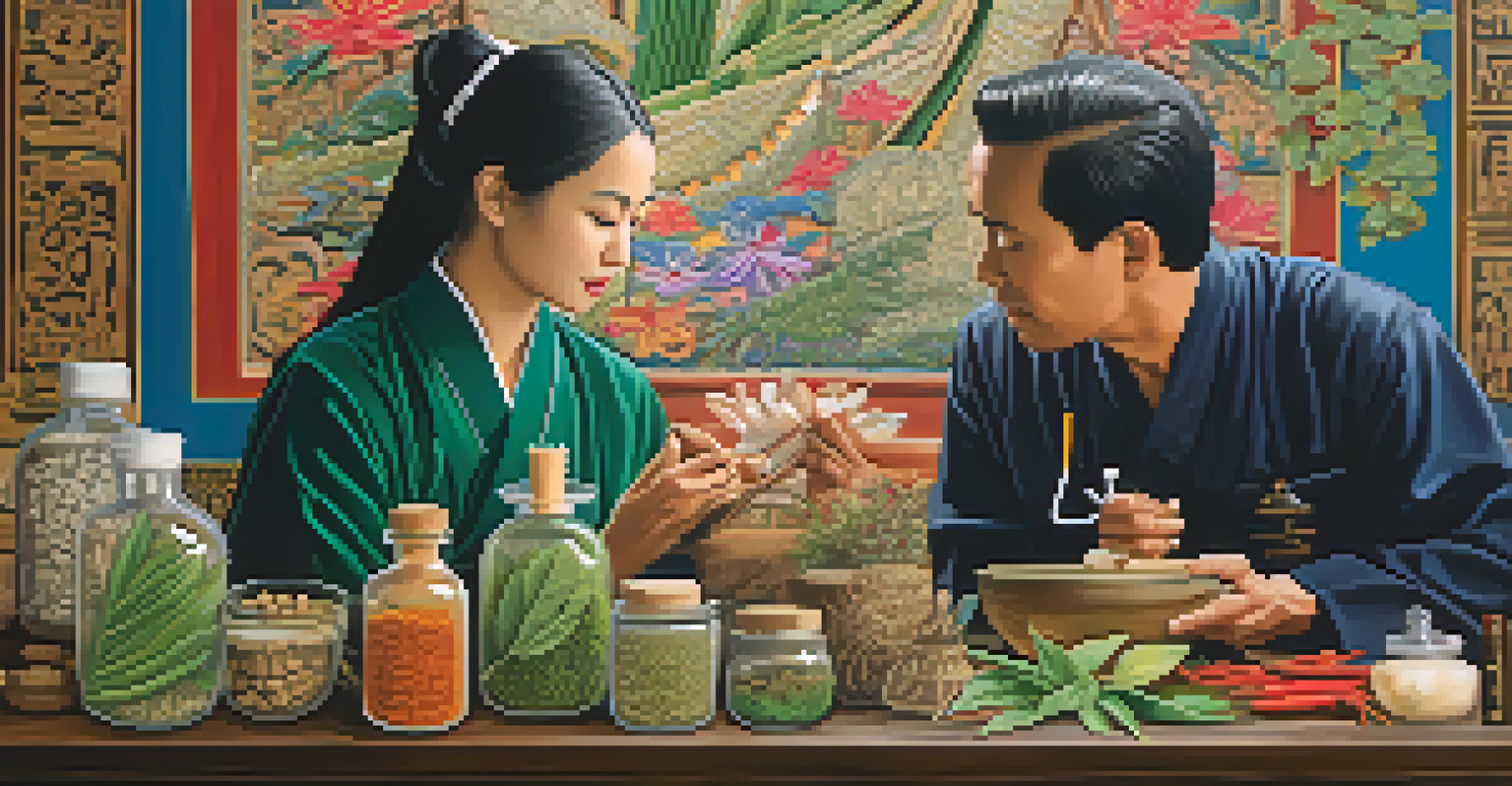Comparative Study: Thai Medicine vs. Western Medicine

Understanding the Foundations of Thai Medicine
Thai medicine, deeply rooted in Buddhist philosophy, emphasizes harmony and balance within the body. It combines elements of herbal medicine, massage, and spiritual practices, creating a holistic approach to health. Traditional Thai practitioners often view illness as an imbalance in the body's energy, which they aim to restore through various therapeutic techniques.
The mind has great influence over the body, and maladies often have their origin there.
An essential aspect of Thai medicine is the use of local herbs and natural remedies, which are believed to have healing properties. For example, turmeric is commonly used for its anti-inflammatory benefits, while lemongrass is praised for its ability to aid digestion. This reliance on nature not only reflects a connection to the environment but also promotes sustainability in healthcare practices.
In addition to physical treatments, Thai medicine places a strong emphasis on mindfulness and meditation. These practices support mental well-being and help patients cultivate a deeper awareness of their health. This holistic view often leads to a more personalized treatment plan that resonates with individuals on multiple levels.
The Principles Behind Western Medicine
Western medicine, often referred to as allopathic medicine, is based on scientific principles and focuses primarily on diagnosing and treating diseases. It employs a systematic approach that relies heavily on research and clinical trials to develop treatments and medications. This method has led to significant advancements in technology and the pharmaceutical industry, making it a cornerstone of modern healthcare.

A hallmark of Western medicine is its emphasis on evidence-based practice, where treatments are validated through rigorous testing. For instance, antibiotics have revolutionized the treatment of bacterial infections, saving countless lives. This scientific foundation allows for precise diagnosis and targeted therapies, which can be incredibly effective in acute care situations.
Thai Medicine Emphasizes Holism
Thai medicine focuses on harmony and balance, integrating herbal remedies, massage, and mindfulness to treat the whole person.
However, Western medicine tends to focus on specific symptoms rather than the whole person. While it excels in treating acute issues, critics argue that it sometimes overlooks the importance of lifestyle and emotional health. This gap has led to an increasing interest in integrating holistic approaches alongside traditional Western practices.
Comparative Approach to Diagnosis and Treatment
In Thai medicine, diagnosis often involves observing physical signs, engaging in dialogue with the patient, and assessing their emotional and spiritual health. Practitioners may use techniques such as pulse diagnosis or tongue examination, which may seem unconventional to those accustomed to Western methods. This comprehensive approach allows for a more nuanced understanding of a person's health.
The greatest wealth is health.
Conversely, Western medicine typically relies on advanced diagnostic tools, such as blood tests, imaging scans, and other laboratory evaluations. These technologies provide precise data that help healthcare professionals diagnose conditions quickly and accurately. However, this can sometimes lead to a more mechanical interaction, where the focus is on the disease rather than the individual.
Ultimately, both approaches have their strengths and weaknesses. Thai medicine offers a more holistic view that considers emotional and spiritual aspects, while Western medicine provides rapid diagnosis and effective treatments for acute conditions. Understanding these differences can help patients seek the best care that aligns with their values and needs.
Cultural Influences on Healing Practices
Cultural beliefs play a significant role in shaping the practices of Thai medicine. For example, the concept of 'Luk Pra Kob,' or energy flow, influences many treatment modalities, encouraging practitioners to consider the patient's cultural context when prescribing treatment. This cultural sensitivity fosters a deeper connection between practitioners and patients, enhancing the healing process.
In contrast, Western medicine is often perceived as more standardized, with less emphasis on cultural considerations. However, the growing recognition of cultural competence has sparked a movement towards integrating patient backgrounds into treatment plans. By acknowledging the cultural dimensions of health, Western practitioners are beginning to enhance their approach to care.
Western Medicine Prioritizes Science
Western medicine relies on evidence-based practices and advanced diagnostics to treat diseases, often overlooking the individual’s emotional health.
This cultural interplay creates an opportunity for collaboration between Thai and Western medicine. By respecting and incorporating diverse healing philosophies, practitioners can provide more comprehensive care that resonates with patients from different backgrounds.
Role of Mindfulness and Mental Health in Both Practices
Mindfulness is a central tenet of Thai medicine, where meditation and awareness are used to promote mental and emotional well-being. Practitioners often encourage patients to engage in mindfulness practices, which help reduce stress and enhance overall health. This emphasis on mental health is seen as crucial to achieving balance in both body and mind.
Western medicine is increasingly recognizing the importance of mental health, with many practitioners advocating for a holistic approach that includes psychological support. Therapy and counseling have become integral to treatment plans, especially for chronic conditions where stress and emotional health can significantly impact physical well-being. This shift is a positive step towards more comprehensive patient care.
Both systems can benefit from each other's strengths in addressing mental health. By integrating mindfulness techniques from Thai medicine into Western practices, patients can experience improved outcomes and a more rounded approach to health.
Patient Empowerment and Informed Choices
In Thai medicine, patient empowerment is a core principle, with practitioners encouraging individuals to take an active role in their healing journey. Patients are often guided to explore their health through lifestyle changes, dietary adjustments, and self-care practices. This collaborative approach fosters a sense of ownership over one's health, leading to more sustainable outcomes.
Western medicine has traditionally been more provider-centric, focusing on expert-driven decisions. However, there's a noticeable shift towards shared decision-making, where patients are encouraged to participate in discussions about their treatment options. This evolution is crucial for enhancing patient satisfaction and adherence to treatment plans.
Integration Enhances Patient Care
Combining Thai and Western medical practices can create more comprehensive treatment plans that address both physical and mental well-being.
The blend of both philosophies can lead to a more informed patient base. When patients are empowered to make choices about their health, they are more likely to engage in preventive care and seek help when needed, ultimately benefiting their long-term well-being.
The Future of Thai and Western Medicine Integration
As healthcare continues to evolve, the integration of Thai and Western medicine presents exciting possibilities. Many practitioners are beginning to embrace complementary approaches, recognizing that each system offers unique insights and benefits. This collaboration could lead to more holistic treatment plans that cater to the diverse needs of patients.
For instance, combining Western diagnostic techniques with Thai healing practices could enhance patient care by addressing both physical symptoms and emotional well-being. This integrative model not only respects traditional practices but also utilizes modern advancements to elevate the standard of care.

Looking ahead, fostering an open dialogue between the two systems will be essential. By sharing knowledge and experiences, practitioners can create a more inclusive healthcare environment that honors cultural diversity while providing effective treatments for all.